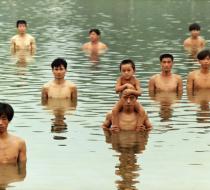Zhang Huan, To Raise the Water Level in a Fishpond Favorite
Zhuang Huan invited more than 40 men - laborers, fishermen, construction workers––who had recently migrated to Beijing from other areas of China to participate. Zhang Huan said, “In order to find these workers, I visited many of the shacks where they live.”
In a single file line, they followed the artist into a pond, then dispersed to raise its water level by one meter. In the third part of the art, Zhang Huan carries a young child on his shoulders as he wades, alluding to his own childhood experiences of playing in fishponds with friends. Zhang Huan said, “This pond is close to where I lived, I can get there with a walk. These participating folks did not understand my intention, but just followed my plan to execute the work. When I saw them, they were like the uncles, aunts and brothers I remembered from my childhood life.”
His collaboration with men whose work positions them on the lower rungs of Chinese social hierarchy was also significant: Only together could they raise the pond’s water level, suggesting the urgency of collective, organized action to effect change.
In the end, however, the act of raising the water level was futile as it did not accomplish anything significant. After the performance, the men would return to their daily lives. “That the water in the pond was raised one meter higher,” the artist says, “is an action of no avail.”
The exhibits satirically, critically or sometimes humorously depict today’s political and social problems. Haily Grenet, a curator of the exhibit, said, the workers’ performance expresses their dedication to a state project to build a modern. Even the child was silently and honestly following directions. Zhuang Huan siad, “The child I was carrying on my back was five years old, the child of the owner of the fishpond, and that day he behaved brilliantly, with a precocity beyond his years." In addition, it presages the tenuous and complicated relation of the individual and the collective at this moment in contemporary China.
There is something tragic in the passiveness of these peasants and in their diligent execution of the instructions. Yet here they are not being exploited to benefit anything, a cause, a product; nor are they exhibited as entertainment. Here they carry out a futile action, just another action among the multiple futilities of existence. "The trendency of self-torturing is not just a personal problem", affirmed Zhang Huan in an interview with Qian Zhijian, and then explained the following:
"It is a common phenomenon, especially so in the present circumstances of China today. In the suburban area of Beijing where we live, there also live thousands of peasants who come from all over the country to make a living selling vegetable. Every morning they have to get up at four o’clock for their work. I believe they wish they could have more time for sleep, like the rest of us. But they can’t. If one has to do something one doesn’t want to do, that is a kind of self-torturing. Everybody has this tendency. Some are conscious of it, while others don’t want to admit it”.
The piece can be understood as a reflection on the individual's attempt to maintain a sense of self and tranquility amidst overwhelming societal transformation. It also raises questions about the consequences of unchecked progress and the potential loss of traditional values and cultural heritage in the face of rapid modernization.
(From Nasher, Koreaherald, christies, Art-Ba-Ba)







